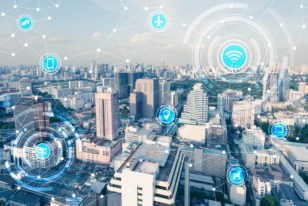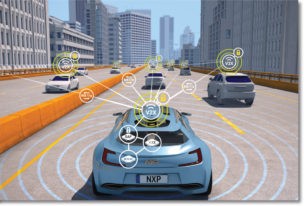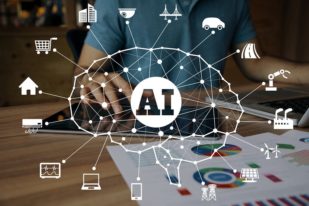Artificial Intelligence, also known as plain AI, is a term that is used a lot lately in the telecom world. A simple description of Artificial Intelligence would be “intelligence developed by machines similar to the one displayed by human beings”. In other words, a machine may acquire knowledge that it may then use to develop ways to make decisions and adapt to a new interchanging environment.
These decisions will be the result of gathering and storing large amounts of data and then use complex computational algorithms to learn, analyze and evolve to the new interactive status. Machine Learning, Machine Intelligence, and Robotics are areas of Artificial Intelligence that are being developed by the Telecom and Computer Science industries.
Artificial Intelligence through the years
When it comes down to Artificial Intelligence, Machine Learning, and Robotics, it is clear that we have definitely gone a long way in the last several decades. From an early AI display of a simple chess game on an 80s Atari to the first human defeat in IBM’s Deep Blue against the world chess champion Garry Kasparov in the late 90s, we have now moved to autonomous, self-driving cars by Tesla, Apple’s Siri, Amazon’s Alexa, Google’s Personal Assistant and early humanoid robots like Hanson Robotics’ Sophia.
However, there is still a lot of work to be done in the AI area, not only regarding the technological advancement needed but also when it comes down to its acceptance by the general public.
In contrast to popular belief of Machines taking over the world, the basic AI principle is quite the contrary. By processing large amounts of data and using advanced computational algorithms, a system may be able to monitor, learn, analyze and become able to adapt to new standards.
For example, population A and population B can be monitored regarding birth rates and life expectancy. This information may be combined with data such as the geographical area of living, expected regional climate, and repetitive natural disasters. A model can, therefore, be developed where an increase of a specific population may be predicted and the corresponding demands on resources, food, jobs may be catered for.
Artificial Intelligence and 5G
The Telecom Industry is ready for 5G massive connectivity and is already exploring the possibilities of AI and the benefits that will arise for society. Machine Learning, Big Data analytics, and advanced algorithms will be used to process and analyze massive amounts of data.
5G Telecom operators will be able to optimize their 5G cloud networks to detect and predict network anomalies, take proactive measures and precautions based on low cost and minor human intervention.
AI can take advantage of the new 5G cloud ecosystem, 5G massive connectivity and the extensive 5G network of sensors and connected devices. 5G smart cities, 5G smart agriculture and the Internet of Things can form the foundations where AI will be able to expand and flourish.
Artificial Intelligence, 5G, and Society
Imagine the scenario, where the button is pressed, everything is connected via extensive 5G connectivity and massive Machine Learning becomes active. The end-user is now able to receive a state-of-the-art experience with minor human intervention and low resulting cost.
Mobile Operators may use their extensive 5G networks to proactively evacuate selected areas and save thousands of lives due to natural disasters such as flooding, tsunamis and volcano eruptions. Forest wildfires can be predicted by analyzing previous data and compare extreme heat and weather phenomena.
5G Virtual Assistants may be used to improve the lives of millions of people with disabilities and provide home care for elderly citizens around the globe. Remote medical healthcare and e-surgery can become a reality with 5G networks and advanced micro-robotics.
5G networks, robotics, and automation could enhance productivity gains and technological advancements in agriculture and livestock raising. Cost-efficient techniques could be developed in the global labor market and skyrocket the industry profits.
AI concerns
Now, think again the above scenario where the button is pressed, everything is connected and massive Machine Learning becomes active. After heavy internal processing and advanced algorithms used, Humanity has eventually been rated as weak, slow adjusted and dysfunctional for future technological development. The Machines suddenly “decide” to take over. Humans race to shelters in the fear of extinction and the war for survival has begun. You may (re)watch the sequel in the Terminator movie series.
If you are a tech junkie and you just can’t wait for the first scenario to take place, wake up and smell the coffee… or just ask your friends. The second scenario is most likely to come in mind when AI is mentioned in any random conversation with friends, colleagues or family.
Despite the obvious benefits of Artificial Intelligence, there are many concerns among society regarding the perception of AI and how it may affect our lives.
The same is true even among employees in the telecom industry. Telecom employees understand better AI’s importance than the average person, however, they are still reluctant to some of AI’s use. How would anyone feel if, for example, their manager was a machine? Would it really make any difference since the employee performance would still be evaluated according to the achieved targets? And what about the Head of their department, the company’s CEO or even ultimately the Head of State being a machine?
Steps to be taken for AI awareness
Going back to the example where let’s say population B ultimately outgrows population A. In a bad case of AI display, the Machine could initially perform some “early detection buffering” by proposing birth planning programs to control the size of the population. If that fails, the Machine could take it a step further and decide to perform “traffic policing” where the excess population could be treated as excess traffic that should be “discarded.”
In other words, there are still significant steps to be made in the area of AI and its perception by the public. The first step would be that the Industry should first educate their employees in order to support its vision towards AI evolution. The second step should be to educate the public since they are the ones that are going to reap the benefits. The last step would be to ultimately form the appropriate Regulation regarding the areas and the level of AI usage and its involvement to society.
It should be made clear, who is responsible for what, by setting the correct framework where the machines only follow the rules that humans dictate. Only then we will be able to change the perception of AI as a presumable tool to raise the “Appetite for Destruction” of the Machines and be able to create our own “Paradise Cities” in the 5G Societies of the future.




One thought on “5G and Artificial Intelligence: A gift to Society or Terminator effect?”